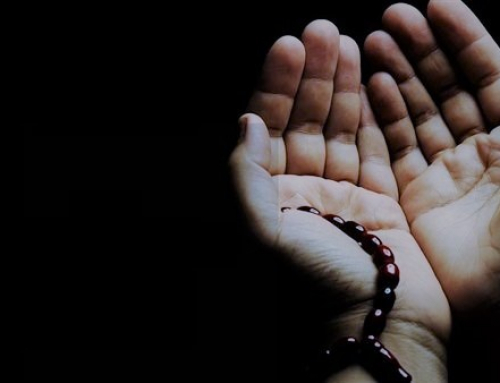Abdessalam Yassine
August 12, 2012
The Believer should perform Du’ā’ ar-Rābiṭa preferably in the early hours of dawn when our Lord—Exalted be He—descends to the First Heaven and asks us if there is anyone who wants to repent, to have his prayers answered and to have his sins forgiven, or whenever it is possible. He should begin his invocation with reading Chapter 1 and asking God to shed His blessings upon the Prophet (God bless him and give him peace).
Then he should ask God to forgive his sins and to grant him as well as to his parents, wife, children and relatives all the good things of this world and of the Hereafter.
Then he should ask God to shed his grace and peace upon God’s Prophets and Messengers from Adam (peace be upon him) to Muhammad (God bless him and give him peace) by mentioning the names of those stated in the Qur’an and praying for those whose names we do not know while bearing in mind the Ḥadīth of the Master of the Messengers (God bless him and give him peace) wherein he says: “When you salute me, do also salute the (other) Messengers, for I am but one of them.
Ath-Tha’labī reported that Abū Sa’īd al-Khudrī said, I heard God’s Messenger (God bless him and give him peace) say on more than one occasion in the end of his Ritual Prayer or when he takes leave of us: Glory to your Lord, the Lord of Honor and Power! (He is free) from what they ascribe (to Him)! And Peace on the Messengers and Praise be to God, the Lord and Cherisher of the Universe. ” (Qur’ān 37:180-2)
Ibn Abī Hātim reported on the authority of ash-Sha’bi and al-Baghawī that ‘Ali (may God honor him) said, God’s Messenger (God bless him and give him peace) said: “Whoever wishes to have the delight of earning the Greatest Reward [al-Mikyālal-Awfā] on the Day of Resurrection, let him say at the end of his session, when he wants to leave, Glory to your Lord, the Lord of Honor and Power! [He is free] from what they ascribe [to Him]! And peace on the Messengers and praise be to God, the Lord and Cherisher of the Universe.
This al-Mikyāl al-Awfā reminds us of the other aforementioned al-Mikyāl al-Awfārelated to shedding God’s blessings upon God’s Messenger (God bless him and give him peace.)
Then he asks God to salute and be pleased with the Prophet’s family, descendants and spouses while mentioning their noble names.
Then he asks God to be pleased with the Rightly-Guided Caliphs and the Ten Companions (1) who were promised Paradise while mentioning their names and the names of the Companions he remembers during the invocation and then prays for all the Emigrants (2) and the Supporters (3) and all the other Companions.
Then he asks God to have mercy upon the Tābi’īn (that is, the following generation after the Companions), and upon the righteous and scholars of the Umma while mentioning each time some of their names.
Then he recites the general Qur’anic invocation, Our Lord! Forgive us, and our brothers who came before us into the Faith, and leave not in our hearts rancor (or sense of injury) against those who believed. Our Lord! You are indeed Full of Kindness, Most Merciful.
Then he asks God for the Believers who strive hard for God’s Cause in our time as well as for the righteous scholars.
Then he expounds to God our Umma’s woes and worries and asks God to grant victory to those who strive hard for His Cause.
Then he prays for those with whom he shares ties of love and joint struggle for God’s Cause while mentioning their names.
Then he asks God for the Umma of Muhammad (God bless him and give him peace) mercy, forgiveness, victory and the good things of this world and the Hereafter.
Then he prays for the future and unity of Islam and victory over our enemies. He ends the invocation by asking God to shed His blessings upon the Messenger (God bless him and give him peace.).
References
| ↑1 | TN: The Ten Companions whom the Prophet (God bless him and give him peace) promised Paradise are the following: the four Rightly-Guided Caliphs (Abū Bakr, ‘Umar, ‘Uthmān, and ‘Ali), Ṭalḥa bnu ‘Ubaydillāh, az-Zubayr bnu al-’Awwām, Sa’d bnuabī Waqqās, Sa’īd bnu Zayd, Abu ‘Ubayda bnu al-Jarrāḥ, and ‘Abd ar-Raḥman bnu‘Awf. |
|---|---|
| ↑2 | TN: The Emigrants [al-Muhājirūn] are the Companions who emigrated fromMecca to Medina. |
| ↑3 | TN: The Supporters [al-Ansār] are the Companions who hosted and supported the Emigrants in Medina. |




